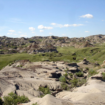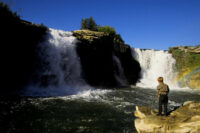The risks of surface mining
By Lethbridge Herald Opinon on July 22, 2020.
Surface mining in Crowsnest Pass would threaten headwater streams
Richard Quinlan
I am a biologist, now retired after a diverse fish and wildlife management career in government, industry, and teaching. At one stage, I spent 12 years as a Fish and Wildlife Habitat Protection Biologist. It was a thankless job of identifying threats to fish and wildlife and their habitat, and recommending measures to eliminate or reduce those threats.
I was based from Edson and had five surface coal mines in my west-central region. I’d review a steady stream of coal-mining development and reclamation plans, and inspect each location before submitting recommendations. I would accompany reclamation officers on their inspections, and was, on average, at a coal mine one to two times per month over that dozen years. I and others would also have to respond to issues and failures at the mines. These were all mountain mines, located on landscapes like the mines now proposed in the Crowsnest Pass.
Environmental regulations were stronger then than they are now. The original East Slopes Policy and Alberta Coal Development Policy guided decision making. And at that time, Alberta Fish and Wildlife had a monitoring and enforcement responsibility for the Canada Fisheries Act, a role that has since been handed over to the federal government.
Things went smoothly at the mines until it rained heavily, or until there was runoff from a high-snowfall winter. Under those conditions, on such steep terrain, catastrophic failures would result. Disturbed slopes would slump, mud would slide, and settling ponds would overflow or get washed out. These failures would cause high levels of silt to deposit into headwater trout streams for extended periods of time. Every year or two there would be extreme events where fish-bearing creeks would fill from bank to bank with hard-packed mud. The stream bed would be enveloped by the hardened mud, and a new creek would have to form on top of that thick silt layer, and then slowly erode its way back down to the original streambed. Silt would be transported downstream for months afterwards. That fine silt would redeposit and concretize the interstitial spaces in gravel that are needed for aquatic invertebrates and spawning and survival of fish eggs.
The basic problem is that high mountain headwater areas are subjected to high snow packs and heavy rainfall events. Those steep landscapes do not have adequate room to construct settling ponds capable of holding runoff from extreme precipitation events. The little ponds that are installed for that purpose become inadequate when they are most needed. The resulting failures have detrimental impacts on water quality, aquatic life and fish. There is no provincial or federal regulation and no engineering solution to this situation.
These catastrophic failures will occur if surface coal mines are approved in the Crowsnest Pass area. It won’t matter how good the design and reclamation plans are, or how diligent the water quality regulation and monitoring is. The steep slopes combined with extreme precipitation events will remain outside the normal regimes the company and government will plan and manage for. Government will officially forgive industry for the catastrophic failures due to their occurring “outside the normal regime.”
The result will be an overall degradation of our headwater streams, with deterioration of water quality and aquatic organisms, including fish populations.
Simply put, surface mining and protection of headwater streams are incompatible in mountain landscapes, such as in the Crowsnest Pass. One excludes the other.
Richard Quinlan of Lethbridge is a retired biologist.
14-13




